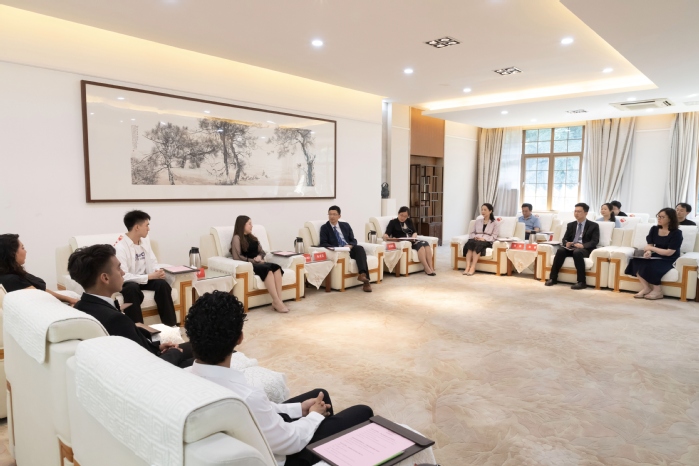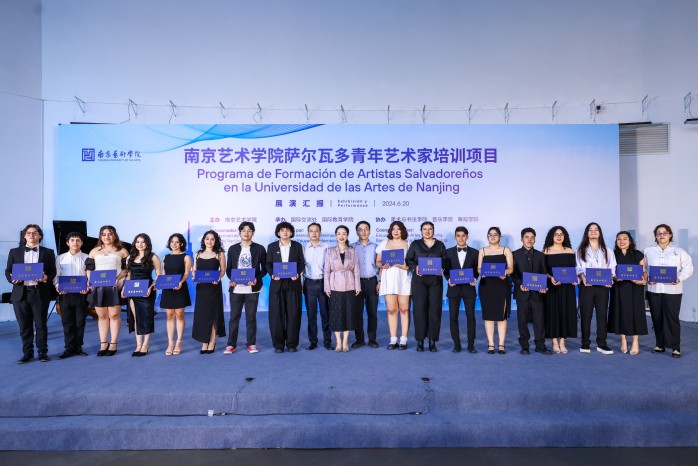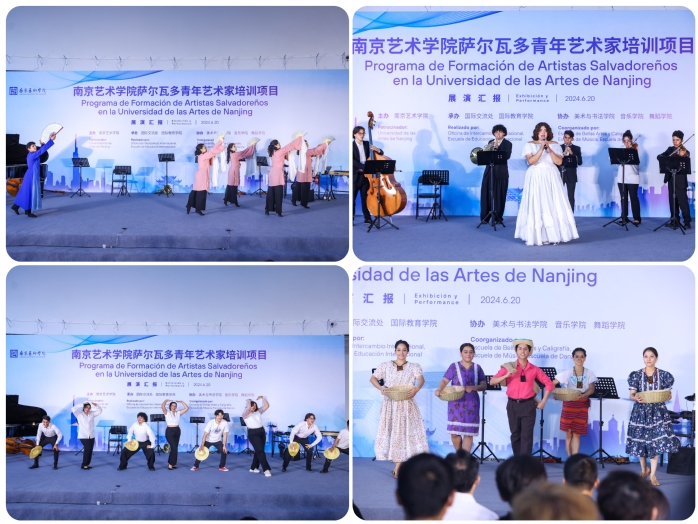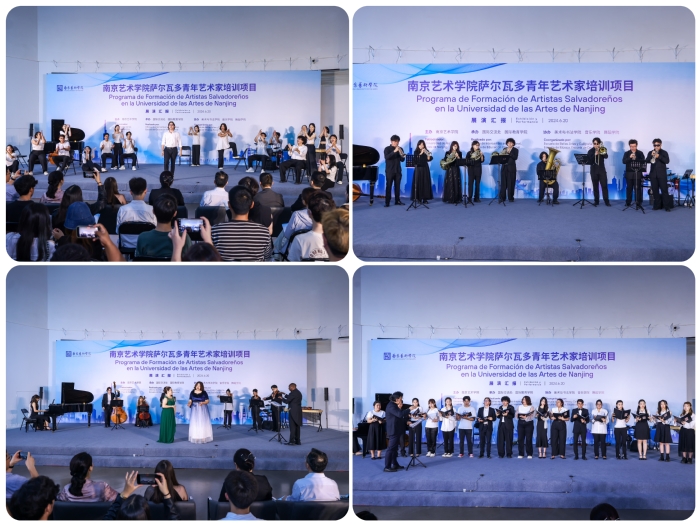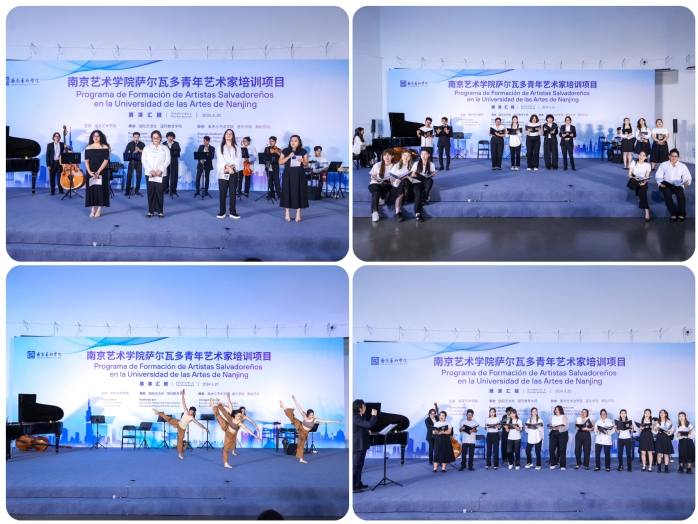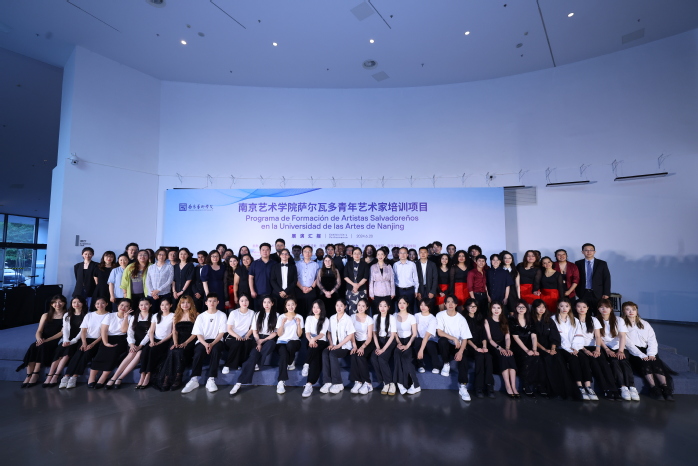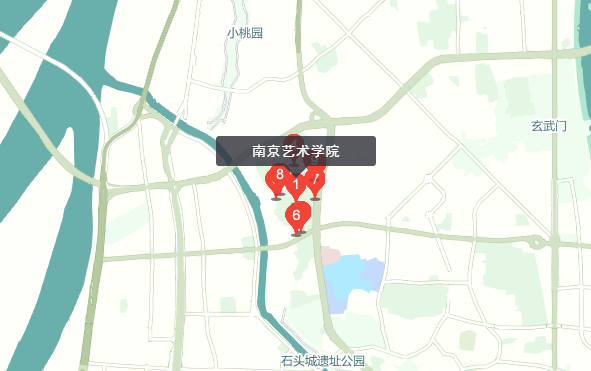| Salvadoran Young Artists Training Program at NUA Adds Color to the China-El Salvador Friendship |
In the vibrant month of June, the city of Nanjing flourishes. On June 20th, within the Art Museum of Nanjing University of Arts (NUA), a lively group of young artists from El Salvador celebrated their graduation with classical music, cheerful folk dances, and energetic pop songs. Over the past year, they studied Chinese at NUA, immersed themselves in art, experienced China, expressed their friendship in Chinese, and conveyed their sincerity through art. They built a "bridge of friendship" between China and El Salvador, filled with warmth, emotion, passion, and vitality. The event was not just a performance but a remarkable dialogue between civilizations. Recently, the United Nations General Assembly unanimously adopted China's proposal to establish the International Day for Dialogue among Civilizations, setting June 10th as the date. Ten days later, on June 20th, with the joint witness of Tian Lulu, Deputy Secretary-General of the China Scholarship Council; Diana Polanco, Consul General and Cultural Affairs Commissioner of the The Embassy of El Salvador in China;Zheng Xing, Deputy Director of the Foreign Cooperation and Exchange Office of Jiangsu Education Department; and Liu Fan, Deputy Director of the Americas and Oceania Division of the Foreign Affairs Office of Jiangsu Provincial People's Government, 17 young Salvadoran artists, together with NUA students from both China and abroad, presented a wonderful performance. This event vividly showcased the unique folk customs and artistic culture of El Salvador. NUA's President Zhang Linghao, Vice President Zhang Jie, and leaders from relevant departments and schools met with the guests in the reception room. On behalf of the university, Zhang Linghao welcomed the visiting guests and briefly introduced the university’s history, discipline development, professional settings, educational achievements, and the exchange visit to El Salvador by NUA delegation last year. He noted that today’s graduation ceremony and performance for the Salvadoran young artists' training program not only showcase the achievements of the 17 young artists at NUA but also serve as a successful example of cooperation in the fields of art and education between China and El Salvador. Our university will continue to contribute to deepening cultural exchanges, promoting mutual understanding, and enhancing the friendship between the two countries, demonstrating NUA's commitment and responsibility.
From not knowing a single word of Chinese to singing the Jiangsu folk song Gedengdai in Chinese; from learning about China through books to making Chinese friends and jointly presenting a splendid performance—this truly exemplifies a rich and tangible dialogue between Chinese and foreign civilizations. As Tian Lulu mentioned, the successful training of Salvadoran young artists at NUA is a vivid example of the robust promotion of the "Study in China" brand. Based on their deep understanding of contemporary China, the students have shared Chinese experiences and wisdom with their families and friends. Surpassing the barriers of civilization through cultural exchanges and understanding China through practical actions and telling its story well. A highlight of this performanceis Salvadoran young artists interpreting the Chinese Kunqu Dance Kun Fan. Kunqu Dance, originating from the traditional Kunqu Opera, was first created by Professor Ma Jiaqin, former dean of the Dance School at NUA and a first-class director. It is one of the exemplary achievements of the creative transformation and innovative development of China's excellent traditional culture. Dressed in traditional opera costumes and holding folding fans, the Salvadoran young artists gracefully danced to the melody. Over the course of a year, they not only honed their professional skills but, more importantly, immersed themselves in the context of Chinese art and culture. They explored, compared, understood, and practiced from the cultural heights of comparing the arts of China and El Salvador. With genuine learning and comprehension, they expressed their heartfelt love through their art. Transitioning from observers to performers, they represent the youthful force that tells China's stories well and envisions a bright future for Sino-Salvadoran cultural exchanges.
Poised to take action, adapting to the circumstances, and committed to long-term efforts, NUA serves as a pioneer in international artistic and cultural exchanges. The Chinese and Salvadoran people share a deep friendship, and NUA uses art as a bridge to actively promote cultural exchanges and mutual understanding. By fostering a greater understanding and communication of arts and culture between China and El Salvador, NUA is accumulating young talent to strengthen the lasting friendship between the two nations. The artistic and cultural exchanges between NUA and Salvadoran artists continue to reach higher levels through frequent and intensive interactions. In 2022 and 2023, with strong support and introductions from the Chinese Embassy in El Salvador, NUA was invited to perform at the receptions celebrating the fourth and fifth anniversaries of the establishment of diplomatic relations between China and El Salvador. In 2023, NUA also hosted the "Oriental Arts Guest" Chinese music and dance performance at the National Theatre of El Salvador, co-sponsored by the Chinese Embassy in El Salvador, the Salvadoran Ministry of Culture, and NUA. The performance was highly praised by the Vice President of El Salvador, the Chinese Ambassador to El Salvador, and various dignitaries. This event showcased the international appeal of Chinese higher art education in Central America and attracted 17 young Salvadoran artists to NUA in September 2023 for advanced studies in music, dance, and other disciplines.
The 90-minute graduation performance report, organized into five segments and three major chapters, was tightly structured, rich in content, and full of emotion. It vividly expressed the Salvadoran young artists' love for art, gratitude to the university, and deep affection for China. In her concluding remarks, Diana Polanco fully acknowledged their achievements over the past year at NUA and expressed hope that this event would further strengthen cultural and artistic exchanges between China and El Salvador, leading to even greater outcomes. The smooth execution of the training program received significant attention from the embassies of both countries, the China Scholarship Council, and other departments. It also benefited greatly from the meticulous arrangements made by NUA's International Education School , with strong support from the Office of International Exchange and Cooperation, the School of Fine Arts and Calligraphy, the School of Music, and the School of Dance.
"China and El Salvador are so different; this year has been a challenging yet rewarding journey, for which we are immensely grateful and will always remember." This sentiment was collectively expressed by the Salvadoran young artists at the end of their program. In every encounter of Chinese and foreign art, NUA leverages its distinct Chinese cultural foundation and outstanding academic strengths to robustly and steadily promote the international dissemination of China's excellent traditional culture. Civilizations become more colorful through exchanges and richer through mutual learning. NUA is committed to advancing China's higher art education model internationally, showcasing the achievements of Chinese higher education in the new era. The university aims to strengthen the innovative brand of "Study in China" and "Study in NUA", using art as a bridge to foster closer ties and mutual understanding among people. This effort serves China's unique diplomatic strategies and contributes to telling the stories of China in the new era effectively.
|
- Copyright
- All text, images, and audio and video manuscripts on this website are only for display on the English official website of Nanjing University of the Arts and are not used for any commercial purposes. The copyright of the works belongs to the authors of each work. No media, website, unit, or individual may download, reprint, link, repost, or reproduce and publish without the written authorization of the school and the author. Otherwise, Nanjing University of the Arts will hold them legally responsible for the behavior.
